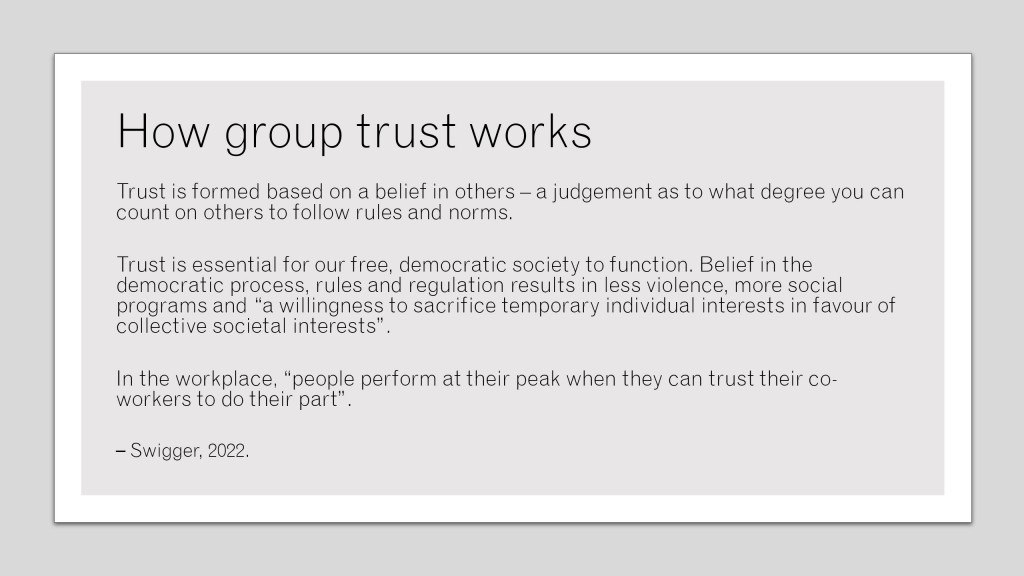This is the 20th post in a series titled ‘All Things Group Work’. The home page is here.
There may be a range of reasons why students lose motivation to engage in group work assessment, but a lack of peer parity usually dominates the list. Learners quite rightly develop a sense of indignation when they perceive a peer to be ‘social loafing’ (Cheng, 2018), but inequity also arises when group members are left out of decision-making. It is hardly surprising that when the next group work assessment is presented that little excitement ensues.
To restore their faith in the benefits of group work, it is essential to develop learners’ sense of trust, both in why they should reinvolve themselves in the pedagogy, but also in their commitment to new group members.
Develop metacognition of group work skills
To begin, make a connection between the content of your course and how it is utilised in teamwork settings in the field. This relevance and identification of it very much being a real graduate attribute should then be complemented by a cognitive explanation of HOW it benefits learning. Following this, the identification of previous barriers and brainstorming ideas and solutions to those barriers primes learners for beginning teamwork activities. Use the image below to scaffold these discussions.

However, all the words and theories in the world won’t work unless there are two fundamental aspects considered from the outset: can the group member trust their peers, and can the group members trust the task.
Developing trust in each other
ChatGPT and other AI platforms present a raft of ideas for how to develop trust through getting-to-know-you icebreaker activities. Knowing each other is certainly the first step in developing trust.
Another effective trust-building strategy is to use scenarios to help learners develop trust schemas. Using the above tutorial activity that explores common group dysfunctional situations where trust is broken, learners identify the issue and consider strategies to resolve the subsequent conflict. By considering a multitude of scenarios, learners are better equipped to understand the need for trust in a team, and at a minimum have some problem-solving ability if trust is broken.
The purpose of the task
I’ve already discussed the importance of task design in team members being able to equitably divide the workload between themselves in terms of peer parity, but what is often not considered in this is the signal it sends to the learners about the quality of the task. If after trying to divide the workload learners perceive that a task is really an individual task presented as a group task then their trust in it is immediately disintegrated. If however learners perceive that real thought has gone into the design of the task then their trust in being able to achieve something meaningful will be high.
Developing group charters
But trust will only truly form in a group when team members see each other committing to the agreed processes to complete the group assessment. Making these processes explicit from the outset, via a group charter or project management document, helps make this commitment visible. And importantly, there should be milestones embedded into the document that facilitate this illustration.
Developing a group charter or project management document is the topic of the next post.
*Thanks to Keturah De Klerk from the University of Adelaide for the PPT slide on trust
References
Aggarwal, P., O’Brien, C. L. (2008). Social loafing on group projects: Structural antecedents and effect on student satisfaction. Journal of Marketing Education, 30, 255-264. doi:10.1177/0273475308322283
Chang Y, Brickman P. (2018). When Group Work Doesn’t Work: Insights from Students. CBE Life Sci Educ. 2018 Sep;17(3):ar42. doi: 10.1187/cbe.17-09-0199. PMID: 30183565; PMCID: PMC6234829.
Swigger, N., (2022), Building Trust is Essential for Improving Society, Lead Read Today https://fisher.osu.edu/blogs/leadreadtoday/building-trust-essential-improving-society

